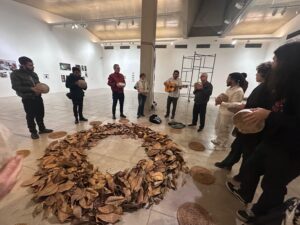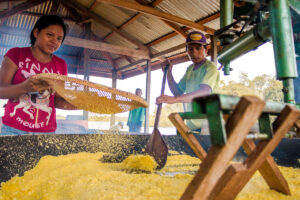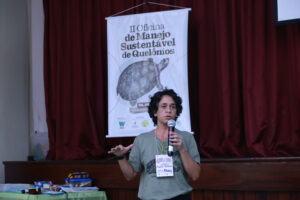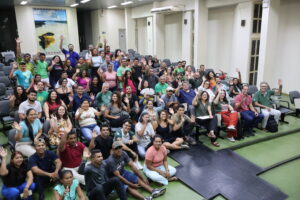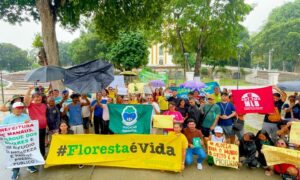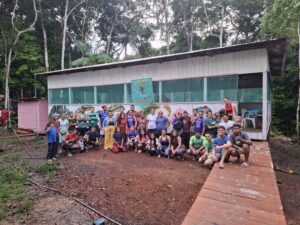By Jorge Pimentel
Translated by Monique Oestreicher
In the heart of the Amazon, where rivers serve as the true highways connecting communities and ecosystems, a boat stands out not only for its size, colors, or design on the side but for its significance and mission. The research boat of the Juruá Institute, named Hylea, is a key piece in the pursuit of scientific knowledge and the preservation of the region’s sociobiodiversity.
A Floating Science Platform
Used as a laboratory, lodging, and meeting space, the Juruá Institute boat is more than just a means of transportation—it’s a floating research center. Local leaders and scientists from various fields, including biologists, ecologists, anthropologists, and traditional forest scientists, embark on expeditions to study the Amazon’s flora and fauna and better understand the strategies and knowledge employed by local communities that rely on these natural resources for survival.
Among the main research conducted on board are studies on fish population dynamics, the impact of climate change on forest life, the quality of life of local populations, and the sustainable management of natural resources. Additionally, the IJ boat serves as a base for environmental education projects, fostering the exchange of knowledge between researchers and local communities.
Impact on Riverside Communities
In addition to its scientific contributions, the Hylea aims to serve as a partner in the daily lives of local populations whenever possible. Many communities have limited access to basic services such as transportation, healthcare, and education, and the boat’s expeditions often include technical assistance and educational workshops.
The exchange of knowledge between researchers and locals strengthens environmental conservation in an integrated manner. The locals, who have lived in harmony with the forest for generations, share traditional knowledge that complements scientific studies, resulting in more effective strategies for biodiversity preservation and various forms of sustainable management in the Juruá River.

Challenges and the Future of Research in the Amazon
Maintaining a research vessel in the Amazon is no easy task. Logistics are challenging, operational costs are high, and bureaucratic barriers are constant obstacles. However, the Juruá Institute has found support through institutional partnerships, funding from international organizations, and the growing engagement of civil society in environmental issues.

With the growing threats of deforestation and climate change, initiatives like the Hylea Boat become even more essential. Science applied to conservation is one of the keys to ensuring the balance of this ecosystem, which is vital for the planet.
As the boat continues its journey through the waters of the Amazon, it carries not only researchers and equipment but also hope—the hope that through knowledge and cooperation, it will be possible to preserve the forest and its riches for future generations.
18 Years Navigating and Assisting Riverside Communities
Almir, the Logistics Manager of the Juruá Institute and Commander of the Hylea, has completed 18 years of work in the region, establishing himself as a reference among the riverside communities. His journey began with the PMJ project (Médio Juruá Project) and, since 2018, with the founding of the Juruá Institute, he has remained with the institution, playing an essential role in supporting the activities of the IJ and local populations.

Known by the locals, the boat used for institutional activities is often called “Almir’s boat,” highlighting the strong bond he has built with the communities over the years. In addition to his daily activities, Almir emphasizes his involvement in rescuing sick individuals who needed to be taken to the city for medical care. For him, helping others has always been a priority.
With years of experience navigating the region’s rivers, Almir says that being on the water is more than just a job; it’s a passion. When he spends too much time away from the river, he misses the connection with the water and the communities he has come to know so well.
The recognition for his work is something that motivates him daily. He expresses gratitude for the affection from the team and the residents along the riverbanks, who welcome him as part of their community.
“More than just a means of transportation, the Hylea boat represents a home for me.” He says he spends more time aboard than in his own house, demonstrating his commitment to the mission of providing support and assistance to those in need.

